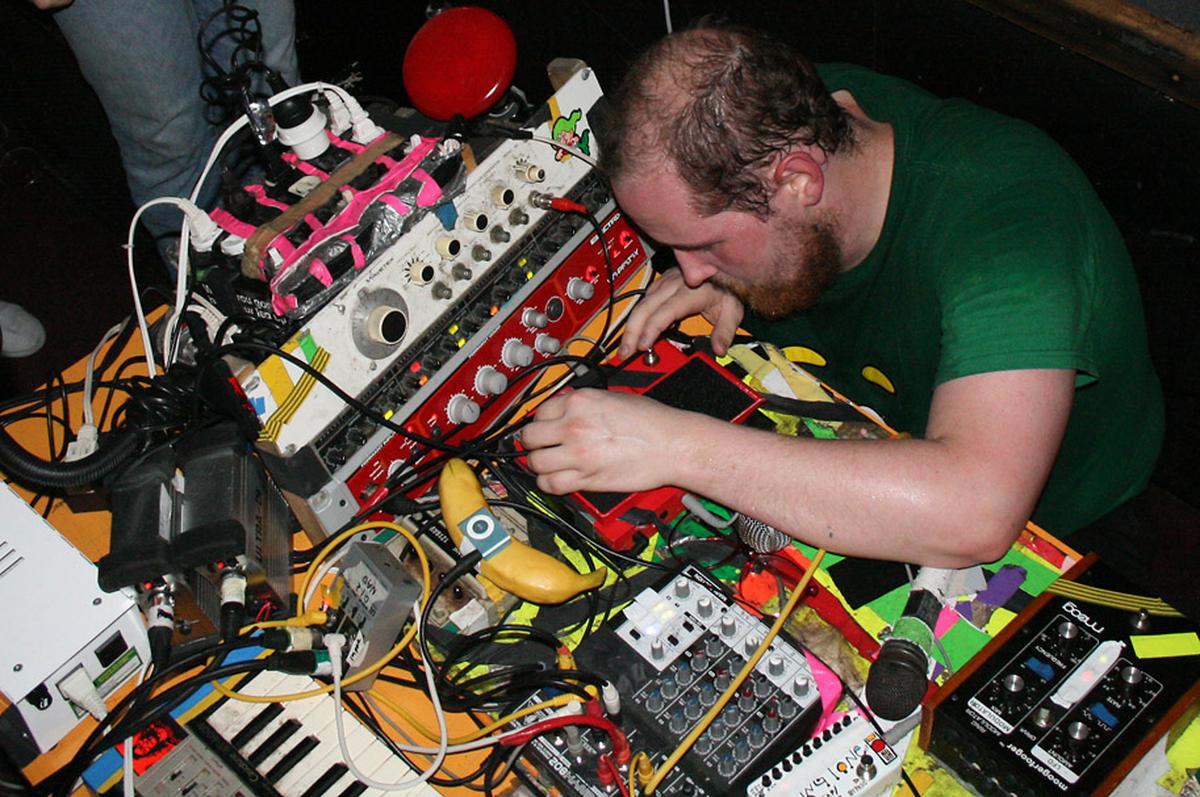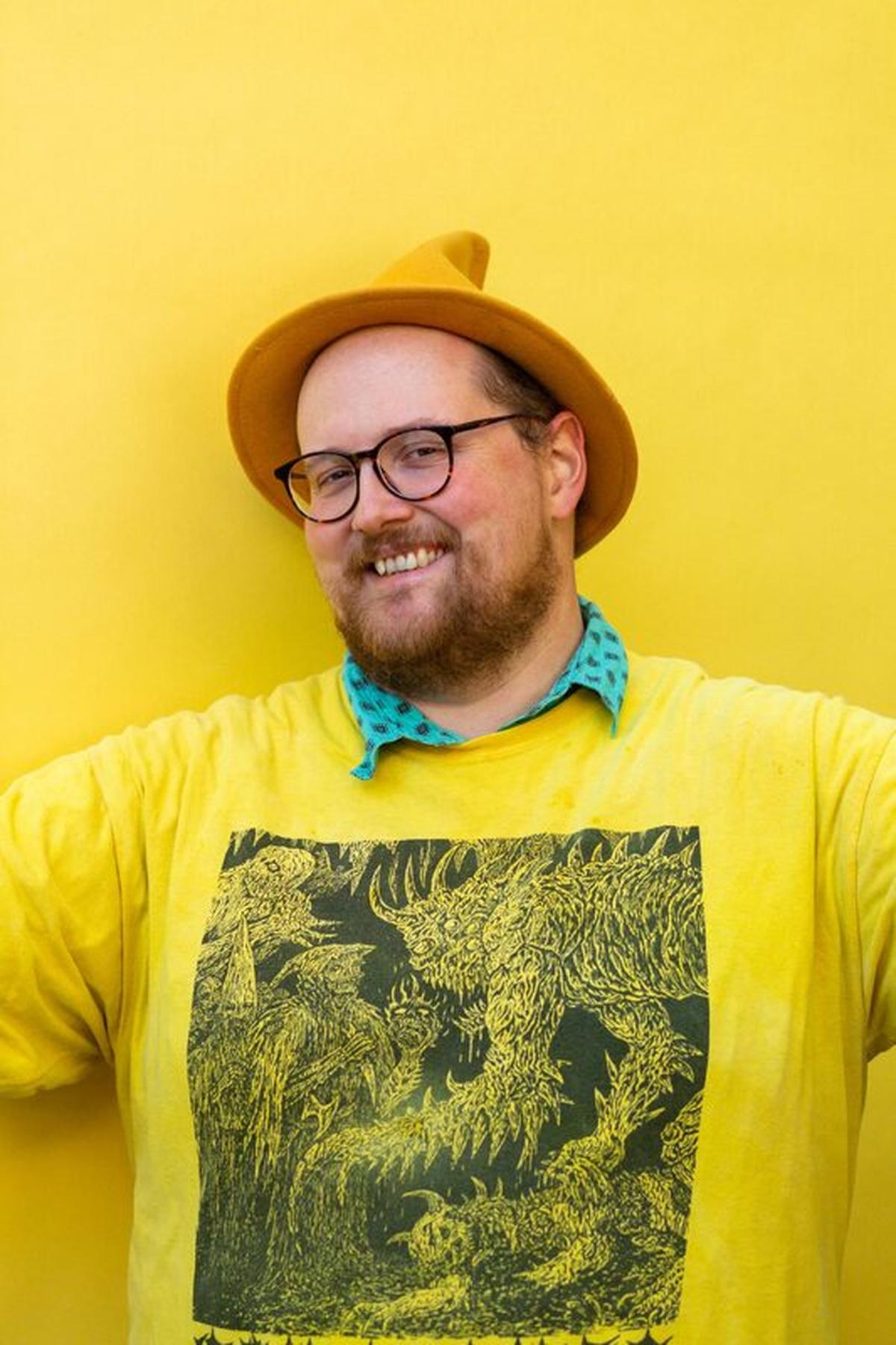Dan Deacon has built a career on excess. The American composer and electronic musician’s early concerts are remembered for their ecstatic dance circles and the feeling of losing hours inside walls of sound, his records for their dizzying layers of voices and electronics. “I found a meditative peace in the immersion,” he says. “Rather than getting past it, I like to push into it and create more of it so that there’s almost a static that drowns out other voices.”

I remember that static well. In college, I spent far too many evenings engulfed by his fourth studio album, Gliss Riffer. The tracks featured a detonation of ad-libbed voices fracturing into kaleidoscope patterns, and arpeggiated synths burrowing into the skull. His breakout hit, When I Was Done Dying — a surreal meditation on death, rebirth, and everything in between — was practically a rite of passage, accompanied by a hypnotic Adult Swim animation that often had me staring at my laptop until sunrise.
Deacon looks back at it fondly. “I’m glad people like the song and I’m glad they like the lyrics,” he says. “They’re important to me, and some of the writing I’ve received about them is the most moving I’ve ever read — from fans, from strangers, even from people who didn’t know my music but felt compelled to reach out. It’s very touching, and it reminds me of the work in my life that moved me in that way and led me to the work I make.”
From the basements and art spaces of Baltimore’s DIY scene, Dan became one of the most recognisable figures in American experimental music. Albums like Gliss Riffer, Spiderman of the Rings and Mystic Familiar cemented his reputation for overwhelming density. He toured relentlessly, building a community around participation as much as sound. “If I could make $70 a show in 2004, I could pay my rent and eat food,” he said. “There’s always a shortage of something, and I think it’s important to be able to improvise. I’m not a purist.”
His first brush with film scoring came unexpectedly, when Francis Ford Coppola reached out to bring him on as a co-composer on Twixt. The invitation seemed unreal for him at the time, but it opened the door. Soon after, he found his footing closer to home with RAT FILM, the Baltimore documentary that became his true apprenticeship. From there, the projects scaled up: Netflix’s Adam Sandler-starrer, Hustle with Jeremiah Zagar, and then Marvel’s Venom: The Last Dancesoon after.
Through it all, the real work was learning by doing. “I realised I didn’t know what I was doing at all,” he said. “I studied composing, but I didn’t study film scoring. From then until now and forever is just that collaboration. It’s not my project. It is somebody else’s project and I need to find a way to make the best music possible for that project. Find that little sliver of a Venn diagram to make them like the music. And that’s fun. It’s a puzzle.”

Now comes Task, Brad Ingelsby’s HBO series, a seven-part crime drama steeped in grief and family entanglements, which reunites him with director Zagar. For Deacon, it is the latest, and perhaps most sustained, version of the puzzle.
“I love Jeremiah and I love working with him,” he says. “He’s a great collaborator and filmmaker and really knows what they want, but is open to experimenting, which I think is the pathway to finding totally new things to fall in love with. This one [Task] was pretty different from Hustle, so it was a pretty wild ride.”
Part of that ride was sheer scale. “Every episode has what we call a ‘beast’, where there was like five to seven minutes of unbroken score,” he said. When I nudged him toward slightly more suggestive specifics, he pulled back with a grin. “No f***ing way dude, this is not my first rodeo,” he laughs, careful not to spoil what was coming.
“In some episodes, it’s like 20 minutes long,” he explains. “We needed to make sure that it gave us thematic information while simultaneously not fatiguing. And I love minimalism. We started to nerd it out about Steve Reich, Phillip Glass, Terry Riley and Meredith Monk.”

Dan Deacon pictured with his equipment during a set
| Photo Credit:
Wikimedia Commons/ Dan Deacons Equipment
As Inglesby’s follow-up to Mare of Easttown, the score’s architecture was characteristically built around families. “We talked a lot about family, grief and trauma, and what it means to be a family,” he says. “We wanted to make sure that we had families of sound represented in motifs for those main families, establishing motifs so that the audience would be in that mindset when they heard a particular texture, or a particular set of instrumentation.”
Dan explains his music in quirky analogies that are unexpectedly moving. The long, unbroken passages he and the team nicknamed “beasts,” he said, were “like my children — I love each one, but the most challenging one’s sucked in the moment.” He compared them to mountain climbs that nearly break you: “it’s probably not that fun while you’re doing it, but it feels really good to be done.”

Later, he compared Gliss Riffer to standing beneath a tree and realising the sound wasn’t coming from one source but from thousands of leaves rustling at once. ““Each one of them is making that micro movement, the way it bends and the light hits it slightly differently and casts a different shadow — that microstructure there is beautiful.”
Most of his best work, he admits, starts as something disposable. “The most fun is the beginning,” he said. “The demo process, when the story is still taking shape in the edit, and I’m just writing demos. That’s when it’s like, we don’t know what we’re making yet. And that’s the exciting part.”
This is classic Deacon: a maximalist who insists nothing is permanent, and a composer of giant swells who claims his favourite part is the sketching. “Once it’s out, it’s the world’s,” he says. “I try not to think about legacy at all. Recorded music, I worry about the history of recorded music. We think of music as being forever, because it is. But not recordings.”
The self-awareness of this line cracked both of us up. He knows he’s rambling and contradicting himself, and yet somehow the contradictions feel honest. His entire career has been one long ramble that somehow found its way into coherence, like a puzzle always expanding.

Dan Deacon
| Photo Credit:
DanDeacon.com
His tools have shifted accordingly. “I love working with full orchestra and live players, but I also love synthesis and samples and sample banks,” he says. “I try to let my ears pick the sounds more than how much of the budget we used to get those sounds.”
And he also lights up talking about some of his favourites — Paul Simon of American pop duo Simon & Garfunkel (‘you can’t go wrong with Paul’), and Greek-French composer Iannis Xenakis, who built storms of sound from math (‘I could listen to Xenakis all day’).

For those of us who once stayed up too late with his rattling the walls, it’s comforting to know he’s still chasing the same immersion, still chuckling at the absurdity of it, and still building intimate families of sound. For all the Coppola calls, Marvel buzz, and HBO prestige, I’ll always see him in that striped shirt at Boiler Room London — headbanging like a giddy shaman, whipping a crowd into hokey dance games like a wizard of nonsense, making the ridiculous feel strangely sacred.
Task is currently streaming on JioHotstar. New episodes air every Monday







